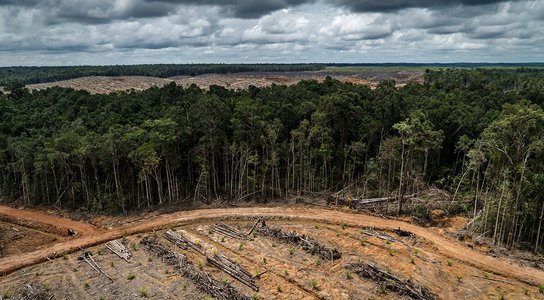This piece from Veronica Oakeshott, Forests Campaign Lead at Global Witness, was originally published on Business Green (20/12/22)
There was a time, not too long ago, when international companies could cause environmental damage all over the world with very little scrutiny.
Thankfully an acceleration in awareness and understanding of the climate crisis has shifted this dynamic but in doing so companies are confronted with a new reality. Having contributed to mass scale deforestation, or other destructive practices, they must ensure they are responsible for a managed phased out of such assets, that remedies the harm they have caused, rather than simply selling up, cashing in and moving on.
One of the flagship initiatives championed at the UK hosted COP26 was the Glasgow Financial Alliance for Net-Zero (GFANZ). It sought to bring the private sector together, including 360 asset managers, to pledge action on reaching net-zero. Whilst the initiative may not have yet reaped huge rewards - Global Witness recently showed that asset managers that signed onto GFANZ are still holding $8.5 billion worth of assets at risk of causing deforestation - there’s no doubt it has focused both eyes and minds on the environmental impact of the private sector.
This was followed up at COP27 with a strong signal of intent from the UN Secretary General Antonio Guterres who rallied against the use of voluntary net-zero initiatives for “greenwashing”, in a clear attempt to ensure that any such pledges are worth more than just the paper they are printed on.
Whilst the clock may be ticking for companies ignorantly and unaccountably putting the future of our planet in peril, the example of one GFANZ member, under the leadership of UN Climate Champion and GFANZ founder Mark Carney, shows what companies do next is the debate the world needs to have.
New research from Global Witness has shown that Brookfield Asset Management, of whom Mark Carney was recently made Chair, was responsible for deforesting an area the size of 11,000 football pitches, across eight Brazilian farms it owned between 2012 and 2021. This deforestation, that Brookfield say was legal, is estimated to be responsible for the release of carbon dioxide equivalent to 1.2 million flights between London and New York.
And the destruction doesn’t stop there, with allegations of attempted evictions of indigenous communities and breaches of slave labour laws all linked to the Brookfield owned farms. Brookfield denies these allegations and their full responses can be found in our ‘Slash and Sell’ report.
This period was mostly before Carney’s time at Brookfield. So, once Carney took up his senior role as Vice-Chair and Head of Transitions in 2021, what did Brookfield do next? It sold the farms off and walked away. Whilst the instinct to do this is understandable, it is completely at odds with what Carney himself is on record as saying is the right course of action and at odds with what the planet needs.
Speaking on deforestation at COP27 (2:05:00), Carney said “You have to have ownership of the problem. Don’t divest your way out of the problem.” A sentiment echoing an appearance at the UK Parliament’s Environmental Audit Committee in October where he told MPs (page 26), “In many respects the easiest thing for an institution to do if they have exposure in an emerging economy to coal or something like that… is to sell it, is to walk away. What we’re looking to do, and we would like to be backed on this as opposed to attacked, is to have responsibility for the institution to have a managed phase out.”
What Brookfield did in Brazil, to confront the environmental damage it caused, was no such managed phase out. And of course, Carney’s advice is right, even if the actions of his firm were so very wrong.
When companies simply sell damaging assets on, they are doing nothing to stop those practices from happening in future. The environmental damage may even increase the monetary value of the asset (cleared land can be more valuable than forested), and so there is a risk the sale even encourages such events in future. The asset is simply transferred to someone who may have even less interest in remedying the situation.
The Glasgow Declaration – spearheaded by UK government at COP26 – committed leaders to halt and reverse deforestation. Carney will know this Declaration well, having been formally engaged as an adviser to the UK government in the run up to COP. But the reversal of deforestation can only happen if companies do better than Brookfield has done and don’t just walk away.
Brookfield could have committed to reforesting the lands it deforested, while also making sure any associated human rights issues were resolved, particularly by providing redress to indigenous communities who had been affected. This might not yet be the norm for company behaviour, but when a company has a multi-billion-dollar balance sheet and the world’s pre-eminent green finance expert at its helm, you expect it to be ahead of the game.
Brookfield must serve as both an example of what companies must avoid and a lesson on how to be better. If financial institutions and the private sector at large want to be taken seriously about tackling climate change, we should all watch very closely what they do next.
